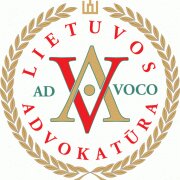Best Inheritance Law Lawyers in Republic of Lithuania
Share your needs with us, get contacted by law firms.
Free. Takes 2 min.
Or refine your search by selecting a city:
List of the best lawyers in Republic of Lithuania
About Inheritance Law in Republic of Lithuania
Paveldėjimas in Lithuania is regulated by the Civil Code and related legal acts. The law covers how a decedent’s assets pass to heirs, the rights of beneficiaries, and how debts are settled from the estate. It also governs how wills are created, challenged, and administered after death. Notaries and courts play key roles depending on whether there is a will and how complex the estate is.
In practice, the process often involves proving the decedent's assets and liabilities, identifying rightful heirs, and distributing property such as real estate, bank accounts, and shares. The goal is to ensure a lawful, transparent transfer of ownership while protecting the rights of statutory heirs and legatees. Because rules can be technical and change over time, many people seek professional guidance from a Lithuanian advokatas or notaras to avoid errors.
Understand that inheritance matters may require coordination across multiple agencies, including land registers and tax authorities. The rules distinguish between testamentary and intestate succession, and they address issues like debts and succession timing. Consulting a lawyer early can prevent delays and potential disputes later in the process.
Why You May Need a Lawyer
- Disputes among heirs over how the estate is divided. A lawyer can help interpret who is entitled to what and represent you in negotiations or court.
- Challenge or validation of a will. If a will is contested for lack of capacity or coercion, an advokatas can guide the process and prepare evidence.
- Opening an estate when there is no will. Intestate succession requires careful identification of legal heirs and proper filing with the notary or court.
- Handling real estate and property transfers. Transferring title to land or buildings in Lithuania requires accurate registrations with the Registrų centras and proper documentation.
- Debt settlement and creditor claims against the estate. A lawyer can prioritize debts and coordinate with creditors during distribution.
- Renunciation or acceptance of inheritance. If you may be forced to accept or decline an estate, legal advice helps avoid unintended consequences.
Having a qualified attorney or advokatas on your side reduces the risk of procedural mistakes and helps you navigate both notarial and court proceedings. A legal professional can also explain the costs, timelines, and options for resolving disputes efficiently. In complex estates, professional guidance is often essential to protect your rights and interests.
Local Laws Overview
Key Statutes and Regulations
- Lietuvos Respublikos civilinis kodeksas - the main legal framework regulating inheritance rights and obligations. It covers testamentary and intestate succession, heirs' rights, and estate administration. The latest consolidated version is published in the official legal acts registry.
- Lietuvos Respublikos civilinio proceso kodeksas - governs court procedures for probate petitions, interpretation of wills, and disputes among heirs. It outlines how to bring matters to court and how decisions are issued.
- Notariato įstatymas - governs notarial activities in inheritance matters, including opening probate files, authentication of documents, and execution of wills. Notaries often manage estate inventories and transfer of titles.
The above acts are continuously amended. For the most up-to-date text and amendments, consult the official legal acts registry. See the sources below for direct access to current versions and changes.
“In Lithuania, notaries usually initiate estate administration when there is a will or when heirs are clearly identified; disputes typically move to court for resolution.”Source: Ministry of Justice and official registries - links provided in the Resources section
Frequently Asked Questions
What is paveldėjimas in Lithuania?
Paveldėjimas is the process by which a deceased person’s assets pass to heirs or legatees under Lithuanian law. It can occur with a will or without one (intestate succession). The Civil Code regulates who inherits and how debts are settled.
How do I start an inheritance case in Lithuania?
First, determine if there is a will. Then gather key documents such as death certificate, will (if any), and property records. Contact an advokatas or notaras to open the estate file with the appropriate authority.
When should I hire a lawyer for inheritance matters?
Hire a lawyer if there are disputes among heirs, questions about a will’s validity, or complex assets such as real estate or shares. Legal counsel helps you navigate notary procedures and court filings.
Where do I file for probate or estate settlement?
Notaries often handle probate filings in straightforward cases. For disputes or where a court order is needed, you file with the appropriate Lithuanian court. The local jurisdiction depends on the decedent’s last residence and assets.
Why might a notary be involved in my case?
A notary administers estates with a will, authenticates documents, and prepares inventories for title transfers. They can issue official estate documents and coordinate with registers for property transfers.
Can I contest a will in Lithuania?
Yes, you can challenge a will if you believe it was invalid due to lack of capacity, coercion, or other statutory defects. A lawyer guides you through the grounds, evidence, and timing for a challenge.
Should I renounce inheritance if the estate has debts?
Renunciation is an option in some cases to avoid assuming responsibility for debts. A lawyer can assess whether renunciation is advantageous given the estate and creditors.
Do I need to visit a notary or a court for straightforward estates?
If the estate is simple and uncontested, a notary can handle the process efficiently. More complex or disputed estates may require court involvement.
Is there a time limit for filing an inheritance claim?
Time limits exist for certain actions, such as challenging a will or notifying heirs. A lawyer can specify deadlines based on the case facts and local rules.
How long does the inheritance process usually take?
Uncontested cases may take a few weeks to a couple of months. Contested matters or estates with foreign assets can extend to several months or more depending on complexity and court schedules.
What documents should I prepare for the process?
Prepare death certificate, any will, identity documents, property records, debt statements, and lists of heirs or beneficiaries. Additional documents may be required by the notary or court.
What costs should I expect in an inheritance matter?
Costs include notary fees, court fees if applicable, and attorney fees. The total depends on case complexity and the value of the estate.
Additional Resources
- Ministry of Justice of the Republic of Lithuania - oversees notaries and civil law procedures; provides official guidance on inheritance matters and notarial services. Website: tm.lt
- Registrų centras - the Centre of Registers responsible for property, land, and other registries used in estate administration; ensures accurate ownership records for transfers. Website: registrucentras.lt
- e-Tar Lietuvos teisės aktų registry - official portal for searching and accessing current Lithuanian laws and amendments, including Civil Code and Civil Procedure Code. Website: e-tar.lt
Next Steps
- Clarify your goal and determine whether the estate requires a will validation, a court proceeding, or notary involvement within 7 days of learning about the matter.
- Collect documents such as the decedent’s death certificate, any will, identity documents, property titles, and debt statements within 2 weeks.
- Decide if you need a notary for straightforward estates or a lawyer for disputes; contact one to discuss your case within 1 week after initial document collection.
- Search for a Lithuanian advokatas or notaras with inheritance experience using official directories or recommendations within 2 weeks.
- Schedule an initial consultation to review your documents and receive a cost estimate; bring all relevant papers to the meeting.
- Engage a lawyer or notary by signing a retainer agreement and outlining responsibilities within 2-4 weeks of your decision.
Lawzana helps you find the best lawyers and law firms in Republic of Lithuania through a curated and pre-screened list of qualified legal professionals. Our platform offers rankings and detailed profiles of attorneys and law firms, allowing you to compare based on practice areas, including Inheritance Law, experience, and client feedback.
Each profile includes a description of the firm's areas of practice, client reviews, team members and partners, year of establishment, spoken languages, office locations, contact information, social media presence, and any published articles or resources. Most firms on our platform speak English and are experienced in both local and international legal matters.
Get a quote from top-rated law firms in Republic of Lithuania — quickly, securely, and without unnecessary hassle.
Disclaimer:
The information provided on this page is for general informational purposes only and does not constitute legal advice. While we strive to ensure the accuracy and relevance of the content, legal information may change over time, and interpretations of the law can vary. You should always consult with a qualified legal professional for advice specific to your situation.
We disclaim all liability for actions taken or not taken based on the content of this page. If you believe any information is incorrect or outdated, please contact us, and we will review and update it where appropriate.
Browse inheritance law law firms by city in Republic of Lithuania
Refine your search by selecting a city.















